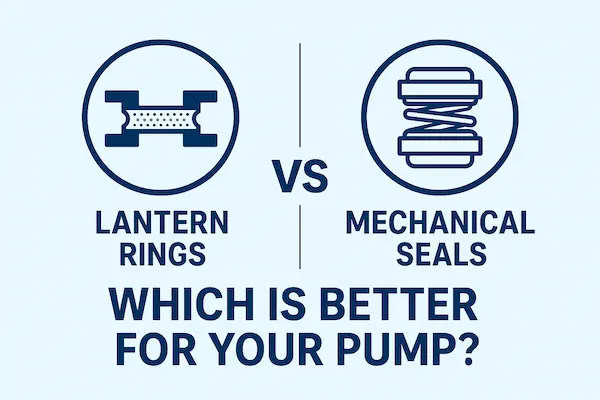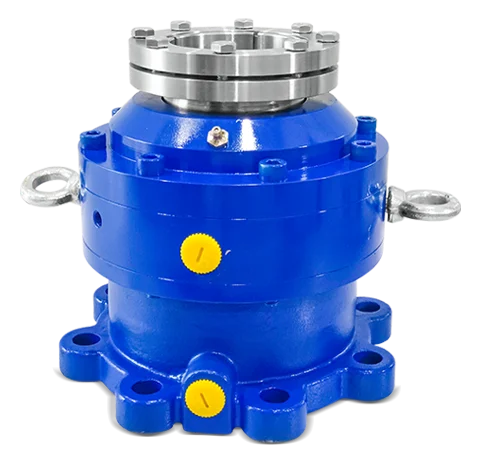Posted At: Aug 04, 2025 - 743 Views

Lantern Rings vs Mechanical Seals: Which Is Better for Your Pump?
When it comes to keeping pumps running efficiently, two crucial components often come up in discussions — Lantern Rings and Mechanical Seals. Both play a significant role in preventing leakage and protecting the pump shaft. However, choosing the right sealing solution can drastically affect your pump's longevity, performance, and maintenance needs.
In this guide, we'll dive deep into Lantern Rings vs Mechanical Seals, compare their functions, benefits, drawbacks, and help you decide which one is better for your pump system.
What Are Lantern Rings?
A Lantern Ring is a circular sealing element typically placed in the stuffing box of a pump between rings of packing. It’s usually made from plastic, bronze, or stainless steel and features radial holes that allow flushing or lubrication fluid to enter.
Function of Lantern Rings:
- Distributes flushing fluid around the shaft
- Reduces friction and heat buildup
- Flushes away solids and contaminants
- Protects the packing from drying or damage
Lantern rings are commonly found in centrifugal pumps that handle abrasive or contaminated fluids, where maintaining proper lubrication of the packing is essential.
What Are Mechanical Seals?
Mechanical Seals are precision-engineered devices used to seal the rotating shaft against a stationary pump housing. They consist of two mating faces (one rotating and one stationary), usually made of materials like carbon, ceramic, or silicon carbide, held together by spring pressure and fluid pressure.
Function of Mechanical Seals:
Prevent leakage of process fluid
Operate at higher pressures and temperatures
Reduce maintenance frequency
Offer a clean and efficient sealing method
Mechanical seals are widely used across industries such as chemical processing, water treatment, and oil & gas due to their reliability and performance.
Key Differences Between Lantern Rings and Mechanical Seals
| Feature | Lantern Rings | Mechanical Seals |
|---|---|---|
| Sealing Method | Packing-based with lubrication flush | Mating surfaces with spring pressure |
| Leakage Level | Allows slight leakage | Minimal to zero leakage |
| Maintenance | Frequent packing adjustment/replacement | Lower maintenance |
| Initial Cost | Lower | Higher |
| Installation Complexity | Easier | More precise |
| Application | Dirty fluids, slurry, low-pressure | Clean fluids, high-pressure, critical systems |
When to Use Lantern Rings
Lantern rings are typically ideal when:
The fluid contains abrasive particles or contaminants
A low-cost sealing option is required
The pump operates in non-critical systems
Frequent access to the pump for packing adjustment is manageable
You’re using gland packing as the primary sealing method
Common Applications:
Paper mills (pulp slurry)
Mining (mud or slurry handling)
Municipal wastewater pumps
When to Use Mechanical Seals
Mechanical seals are a better choice when:
You require tight sealing with little or no leakage
Operating under high pressure or temperature
System downtime is expensive or unacceptable
Environmental compliance requires leak-free systems
Pumping hazardous or corrosive fluids
Common Applications:
Chemical processing
Food and beverage industry
Oil and gas refineries
Water and wastewater treatment
Benefits and Drawbacks Lantern Rings
Benefits:
Simple to install and replace
Cost-effective for low-pressure systems
Effective for dirty or slurry applications
Can extend packing life with proper flushing
Drawbacks:
Requires regular maintenance and monitoring
Designed to allow controlled leakage
Not suitable for hazardous or high-precision applications
Mechanical Seals
Benefits:
Leak-free operation improves system cleanliness
Long lifespan with proper setup
Handles high-speed and high-pressure conditions
Reduces maintenance needs significantly
Drawbacks:
Higher upfront cost
Requires skilled installation and alignment
May fail if solids are present without adequate flushing
Cost Comparison: Upfront vs Long-Term
While lantern rings offer a lower purchase and installation cost, the long-term cost can be higher due to:
Frequent packing replacements
Regular maintenance
Downtime from manual adjustments
On the other hand, mechanical seals provide:
Improved sealing performance
Lower water usage and waste
Longer operational life with fewer interventions
This often results in a lower total cost of ownership in many industrial applications.
Sealing System Efficiency: Which Is Better?
Efficiency depends on your application.
If you're handling clean liquids in a critical system where downtime is costly, mechanical seals are the superior choice. However, in abrasive or dirty environments, especially with slurry or fibrous content, lantern rings combined with packing offer better resilience and cost control.
Upgrading from Lantern Rings to Mechanical Seals
Many pump systems are transitioning from traditional packing systems with lantern rings to mechanical seals for better reliability and efficiency.
Why switch?
To reduce water loss and leakage
To meet regulatory requirements
To minimize manual intervention and downtime
However, upgrading requires checking shaft conditions, housing alignment, and possibly retrofitting the stuffing box or seal chamber.
Maintenance Considerations
Lantern Rings:
Regularly inspect packing and lantern ring position
Monitor for excessive leakage
Maintain proper flush water pressure
Mechanical Seals:
Monitor for heat, vibration, or leakage
Ensure clean flushing or cooling fluid
Replace only during planned maintenance intervals
Environmental Impact
Mechanical seals are more environmentally friendly due to reduced leakage and lower water consumption. In contrast, lantern ring systems typically require continuous flushing, leading to higher fluid usage and potential waste.
Which Is Better for Your Pump?
To decide between Lantern Rings vs Mechanical Seals, consider:
| Factor | Best Option |
|---|---|
| Clean fluid, high-pressure, low leakage | Mechanical Seal |
| Dirty, slurry, abrasive fluid | Lantern Ring + Packing |
| Budget constraints | Lantern Ring |
| Environmental regulations | Mechanical Seal |
| Minimal maintenance | Mechanical Seal |
Conclusion
Both lantern rings and mechanical seals play vital roles in pump sealing systems. The right solution depends on your fluid type, operating conditions, budget, and long-term performance goals.
At QM Seals, we offer a wide selection of mechanical seals, gland packing, and lantern rings tailored for a range of industrial pump applications. Whether you’re upgrading your system or replacing worn components, our team can help you choose the best option for your setup.


